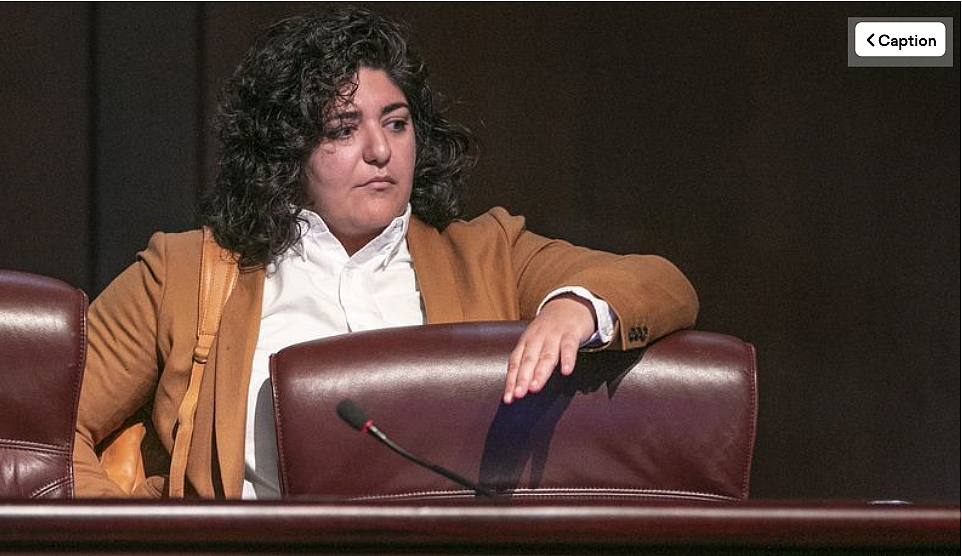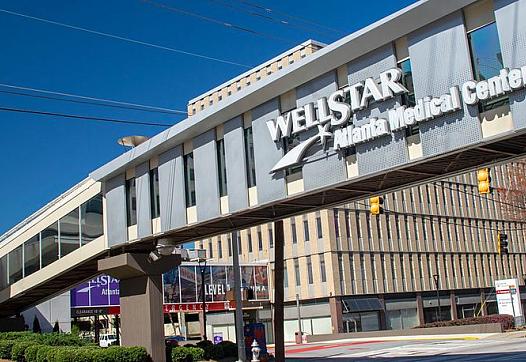Atlanta council member accuses Wellstar of never wanting to provide urban health care
Ariel Hart’s reporting on gaps in medical services in Georgia was undertaken as a project for the USC Annenberg Center for Health Journalism 2022 National Fellowship.

Council member Liliana Bakhtiari prepares to take her seat on the dais as the Atlanta City Council held their first in person meeting since they were suspended at start of the pandemic In Atlanta on Monday, March 21, 2022.
robert.andres@ajc.com
By Wilborn P. Nobles III and Ariel Hart
Atlanta City Councilmember Liliana Bakhtiari recently criticized the Wellstar Health System on WABE by accusing the nonprofit of having ulterior motives for closure of the Atlanta Medical Center.
Wellstar pushed back strongly in a statement defending its actions.
During a 26-minute interview Tuesday on “Closer Look With Rose Scott,” Bakhtiari was asked about the exclusive Atlanta Journal-Constitution report in which Mayor Andre Dickens said Wellstar received purchase offers for AMC, and had it valued prior to publicly announcing the hospital’s closure.
Bakhtiari initially acknowledged Wellstar’s argument that the hospital was losing money and the building required renovation that Wellstar could not afford. But the councilmember also said Wellstar officials knew about the condition of the century-old building when they purchased it in 2015.
Bakhtiari pointed out that Wellstar purchased the AMC as part of a package of five hospitals, only to close two of them this year, in May and November.
“If the true motive behind Wellstar...is to actually help people in need and help provide health care to all people ... then they would have been honest from the get-go,” Bakhtiari said. “This was not a surprise to them. This was a planned out motive.
“They bought five hospitals. They shut two down in South Fulton that predominantly help people of color and people in low-income status. They kept the three open in North Fulton that help predominantly white communities.” Wellstar said those comments were mistaken.
“Let us be absolutely clear: closing AMC was never the decision we wanted to make and any suggestions to the contrary are simply untrue,” health system officials said in a statement Wednesday morning.
Wellstar also pointed out that it recently announced a partnership with Southside Medical Center to improve access to primary and preventive care for the East Point community.
“We remain committed to caring for the South Fulton community and are working with leaders and stakeholders to design new modes of healthcare delivery that encourage whole-person health and wellness, not just episodic care when patients are sick or injured,” the statement said.
It added: “We initiated an exhaustive two-year search for a buyer or partner to help find a solution to keep AMC open, but none were willing to move forward. We were also unable to secure any public or government funds to help continue to operate AMC.”
Bakhtiari’s council district includes a portion of the land where the AMC is located. The councilmember maintained that there were infinite ways in which Wellstar could have worked with other agencies to maintain both profits and health opportunities in the community, including working with the government or selling a portion of the building. However, Bakhtiari said Wellstar’s actions suggest the nonprofit just wants to sell to the highest bidder.
Controversy erupted after Wellstar on Aug. 31 announced its intended closure of the century- old hospital. It intensified this week after Dickens acknowledged his discomfort about Wellstar’s intentions with the land, and said he learned Wellstar had received valuations on the site.
Wellstar officials said earlier this week that it performed “informal assessments of the property’s value” as part of an effort that began in 2020 to sell or find a partner to run AMC. It did not specify when those took place, except for a very informal one in September of this year after the closure announcement. Likewise, Wellstar officials did not say whether anyone else had commissioned an appraisal as part of previous talks.
Wellstar said in an earlier statement that the AMC property is not under contract for sale, and that the nonprofit is not currently engaged in conversations with buyers or developers regarding the future of AMC’s buildings and campus. It has emphasized that it closed AMC because of its poor financial performance, not because of the land.
“After six years and more than $350 million invested in capital improvements and to cover sustained operating losses, the multi-faceted challenges facing AMC specifically were simply too much for Wellstar to overcome,” the statement said.
“Some of the buildings in the hospital are nearly 100 years old, with many mechanical and support systems at the end of their useful life, requiring a demolition and rebuild that would cost at least $750 million for a comparable facility, and likely more than $1 billion.”
The AMC was one of Atlanta’s largest providers of care to the poor, so residents were shocked with the closure. Atlanta city officials enacted a redevelopment ban at the site that will expire in April.
Dickens says the city wants to prioritize the continued use of the site, in whole or in part, for health care services. He told the AJC he’s willing to work with City Council to keep the moratorium in place as long as needed.
On Tuesday, Scott pushed Bakhtiari to acknowledge that Atlanta can’t indefinitely ban permitting or zoning changes to the property. Bakhtiari told Scott the mayor enacted the moratorium to give the community an opportunity to react first to any proposals for the site if Wellstar has a buyer lined up.
“You don’t get to just take a 25-acre health facility that has been the Trauma I facility — one of the few in the city if not the state — and get to just shut it down with the intention of selling it off to whoever to build luxury housing,” Bakhtiari said. “No, no. So we’re very much following the mayor’s lead.”
[This article was originally published by The Atlanta Journal-Constitution.]
Did you like this story? Your support means a lot! Your tax-deductible donation will advance our mission of supporting journalism as a catalyst for change.

